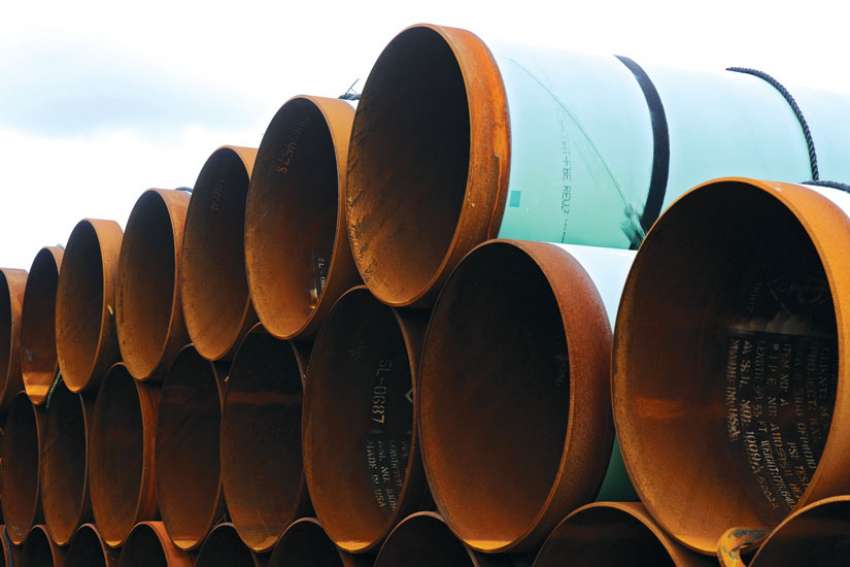The 2010 National Energy Board approval of Keystone XL was done without any consideration for Canada’s climate commitments, says the Toronto-based group, Environmental Defence. Canadian approval of the pipeline came prior to Canada’s signing of the Paris Climate Agreement and before the Pan-Canadian Framework was put in place.
The pipeline is to export bitumen from the Alberta oil sands via a line running 1,897 kilometres from Hardisty, Alta., to the U.S. Gulf Coast where it will be refined.
Patrick DeRochie, Environmental Defence’s climate and energy program manager, said “The game has changed in the last seven years.”
Not only are new federal commitments in place, but the Alberta government has legislated a cap on greenhouse gas emissions of 1,000 megatonnes (mt) a year, DeRochie said. With another 23 to 27 mt a year committed to two other recently approved pipelines, “we don’t see any way of another pipeline being approved and staying under that limit.”
Federal Natural Resources Minister Jim Carr expressed delight at Trump’s approval of the pipeline, saying it will “result in many, many jobs for Albertans” and that the pipeline is important to provide access to world markets.
Keystone XL development was stalled in 2015 when it was rejected by then U.S. President Barack Obama after lobbying from environmental groups.
While the main point of opposition to Keystone XL is the increase in greenhouse gas production that it would bring in the oil sands, other concerns include potential negative effects on groundwater along the pipeline route and the rights of indigenous peoples and landowners.
Randy Haluza-Delay, a sociologist at The King’s University in Edmonton and co-author of How the World’s Religions are Responding to Climate Change, stated point blank: “We need to transition off fossil fuels.”
The relative cost of various forms of energy has changed drastically since Canada’s 2010 approval of Keystone XL, he said. The cost of solar power has dropped dramatically, making it now the most cost-effective energy source, once government subsidies are removed from consideration.
With most of the pipeline construction and all of the bitumen refining taking place outside of Canada, the province would be “shipping value down the pipeline,” Haluza-Delay said.
Alberta Premier Rachel Notley has given a nod of support to Keystone XL, but also says the government’s main concern is getting oil sands to tidewater in Canada in order to diversify its markets.
Notley also maintained that pipeline development will not increase oil sands production, but will cut the cost of shipping bitumen to markets.
As well, the number of Canadian jobs to be created by Keystone XL is relatively small in comparison with projects where the entire pipeline will run through Canadian soil.
DeRochie and Haluza-Delay agreed that although Trump has put his stamp of approval on Keystone XL, that doesn’t mean the pipeline will be built.
Legal and regulatory obstacles remain in the U.S., and farmers, Native Americans and environmentalists are protesting the pipeline, said DeRochie. “I can see that opposition growing.”
Haluza-Delay said, even with approval, TransCanada Corp., the company which wants to build the line, will have to do a new analysis of its economic viability. “A new business case has to be made.”
Churches have issued no statements on pipeline proposals in recent decades, although Bishop Luc Bouchard, former Catholic bishop of St. Paul, Alta., in 2009 issued a lengthy and scathing moral assessment of oil sands development.
After examining the effects of the oil sands on the environment and on First Nations communities, Bouchard concluded, “The present pace and scale of development in the Athabasca oil sands cannot be morally justified.”
Haluza-Delay, however, is not calling for churches to take a political stand on particular issues, such as Keystone XL.
Rather, he maintains pastors and priests should be more forthright in discussing general Christian principles, such as care for God’s creation, living simply and caring for our neighbours, not just those near to us, but those around the world.
“We’re not talking about caring for creation in the mainstream life of the Church,” he said. “We need to change our lifestyles so other people can simply live.”
(Argan is a freelance writer in Edmonton.)


